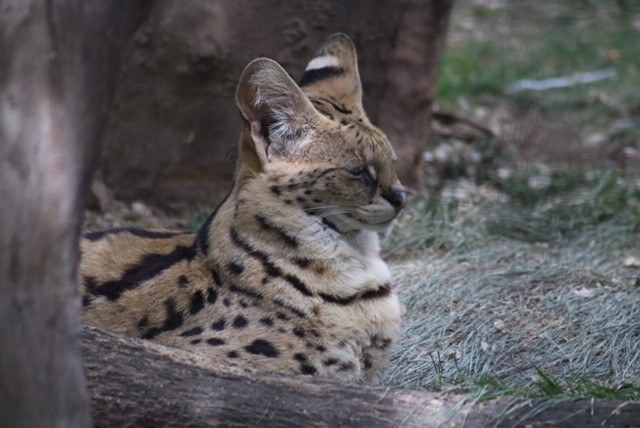African Serval
Learn about African servals and live the life of a serval through a hands-on activity.
Goal
Learn about African servals and discover the ways that ABQ BioPark zookeepers keep their resident serval healthy and happy.
Introduction to Servals
The serval is a small- to medium-sized wild cat native to various regions in Africa. Their cream/yellow bodies are covered in black spots and stripes that help them camouflage in their savanna/grassland homes. They stand about 21-24 inches at their shoulders and weigh in at 20-40 pounds. These wild cats have very long legs (the longest of any cat) relative to their body size. Their normal lifespan is about 19 years. They spend their time patrolling their home territory, which can range from 4-12 square miles and usually overlaps with other servals. These solitary cats use scent communication to avoid interactions with other servals that may cross their territories.
Servals are carnivores: their usual prey includes rodents, small birds, frogs, insects and reptiles. They have many adaptations to help them hunt. They use their excellent hearing to locate prey. Once a meal is found, servals can jump more than six feet in the air to land on their prey, delivering a fatal bite to the head or neck.
Servals are rare in northern Africa but common in southern Africa where they are found in grasslands, moorlands and bamboo thickets at altitudes up to 12,500 feet. They prefer to live near water.
African Serval at the ABQ BioPark

The ABQ BioPark is home to one serval named Savannah. She is 18 years old and serves as an education ambassador. Part of her role at the BioPark is to come out of her habitat in a harness and leash to meet and interact with Zoo visitors. This important job allows visitors to learn about servals and see some of their amazing adaptions up close but it’s a big job that requires a lot of training. Savannah's care team works with her every day to build relationships so that she can feel safe leaving her home. Keepers also train Savannah in a variety of behaviors that help improve her care. Many of the behaviors that she has learned help her keepers and zoo veterinarians monitor her health. For example, when asked, Savannah will offer her paws and legs for inspection. This up-close examination is critical for her wellbeing, and allowing her to offer it on her own minimizes the potential stress of a checkup. As Savannah has aged, she has become less inclined to go out for walks. The ABQ BioPark respect the decisions of the animals in our care, and so it's now a rare treat to see Savannah out walking the Zoo.
Conservation
Although serval populations are stable, they face some challenges. Like many other mammals, they are threatened by the loss of their habitat. Their beautiful fur can also make them a target for poaching. They are also sometimes taken from the wild to be pets. Although servals are intelligent, charismatic animals, they do not make good pets. Servals are wild animals and require extensive, complex care that cannot realistically be provided in a house. Domesticated animals, like dogs and house cats make the best pets since they are adapted to live alongside humans. Anytime you bring a pet home, make sure to do your research to ensure that you can provide the best care for your new animal.
Activity
Take a cat nap! Hunting and surviving is hard work and cats sleep for much of the day. Servals, in particular, usually nap during the hottest part of the day. Take a cue from the cats and take a restful nap. Once you’re awake, it’s time to go explore. As you walk outside, listen closely. Servals have great hearing—each of their ears can rotate 180 degrees to locate sounds. Listen to the world around you: try to locate and identify the source of the things you hear. Now, find a shady, sheltered place to sit still. See if you can blend in. Watch your surroundings closely and when you see something you want to explore, jump! Can you jump as high as a serval? All that looking, listening, jumping and exploring takes a lot of energy. Find a shady spot and relax or even take another nap.
